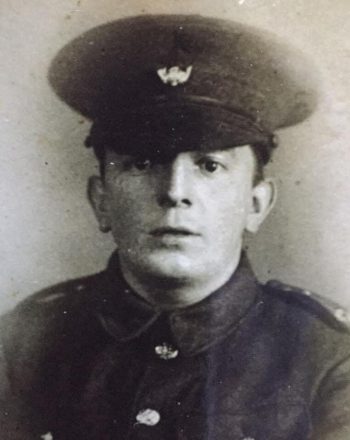
I posted this photograph of George Biggin on the British Army Ancestors Facebook page and was contacted by George’s great great niece, Sally, shortly afterwards. I had written the following:
“241908, formerly 4936 Pte George Biggin of A Company, 1/5th Battalion, King’s Own Yorkshire Light Infantry, was killed in action on the 19th July 1917. He was 26 years old and, had his country not called him, would probably never have dreamed of becoming a soldier. Like so many others he answered that call and paid the ultimate price. Thank you, George, for your service. You are not forgotten.”
Sally adds the following information about him:
George was one of three brothers who served. His younger brother was also killed and another was injured and received a silver war badge.
George, was born in 1891, one of eight children of Thomas and Selina Biggin, who lived in Dore, (at the time in Derbyshire, now in South Yorkshire). By the time of the 1911 census, he was living with his father (a scythe smith), mother, brothers Maurice, Ellis, Robert, and Stanley along with his nephew, Benjamin (my grandfather) and niece, Lydia, in a tiny four roomed cottage on Barker’s Row, Dore. His other brothers and sister were Thomas, Henry and Mary Alice who no longer lived at home. George was employed as a horseman on a farm.
“He enlisted in Sheffield in the spring of 1916 and was posted to the 1/5th Bn King’s Own Yorkshire Light Infantry, arriving in France in the summer of that year. His younger brother Robert, was at the time missing, one of the casualties of 1 July 1916. (His parents were still appealing for information about Robert in October 1916. His body was never found and his name is on the Thiepval Memorial).
On 17 July 1917 the battalion were at Nieuport, relieving 1st Dorsetshire Regiment in the Lombartzyde sector. George was killed by shellfire on the night of 19 July. He was buried in Ramscappelle Military Cemetery next to other men from the battalion. The inscription on his headstone reads: ‘When I left home I little thought that my race was so near run’. He left £1 3s 9d to his father, who also received a war gratuity of £6. He received the Victory Medal and British War Medal.
Three days after his death, on the 22nd July, CQMS Ernest Firth of A Company, 1/5th KOYLI wrote to inform George’s mother of his death
Dear Mrs Biggin
It is with the very deepest regret I have to inform you of the death of [George Biggin]. He was killed by shell fire on the night of the 19th inst and it may be some slight consolation to know he suffered no pain. He has been with this company a long time and I have always found him a very capable and willing lad and one we are all very sorry to lose. He will be greatly missed by the boys in No. 4 platoon. He is buried in a British soldiers’ Cemetery just behind the line with a wooden cross on his grave but I am not allowed to mention the place but in some future date I shall hope to tell you all. I know this sad news will be hard to bide but try and bear up [unclear] honestly serving his King and Country. Please accept the officers’, NCOs’ and men’s deepest sympathy in your sad bereavement.
George is commemorated on the war memorial in Dore, the roll of honour in Christ Church Dore, and is also remembered on the family headstone in the churchyard.
Leave a Reply
You must be logged in to post a comment.